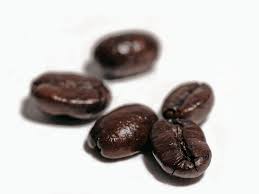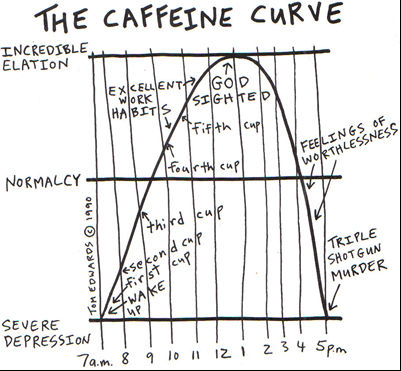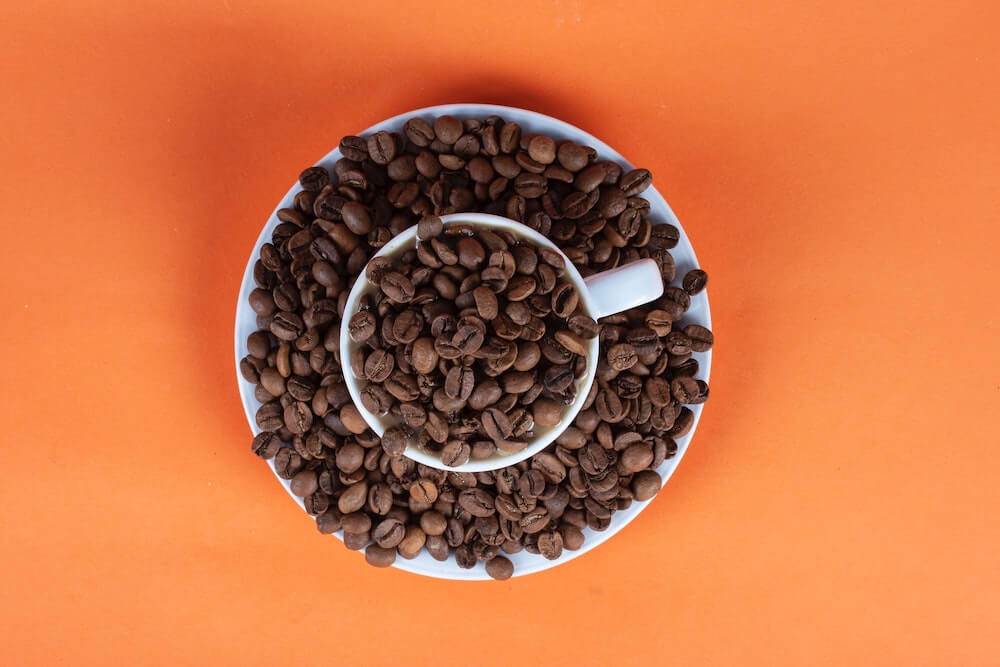
Caffeine intake, particularly in the form of coffee drinking has long been a subject of debate in the realm of nutrition. Some argue that coffee is more of a drug than a food, asserting its potentially harmful effects on the body. Conversely, others extol its medicinal benefits, recommending its consumption for various health conditions or as a preventative measure. As a self-professed coffee connoisseur, I often find myself torn between these contrasting viewpoints, recognizing the complexity of the issue.
In her book, The Diet Cure, Julia Ross discusses how stimulants like coffee can impose significant stress on the body. She highlights the depletion of essential nutrients such as B1, biotin, inositol, vitamin C, calcium, potassium, and zinc, along with the potential overstimulation and weakening of vital organs and systems. Moreover, Ross notes the presence of pesticides and free-radical producing hydrocarbons in coffee, which can compromise cell membranes.
An intriguing image (below) depicts the potential mood-altering effects of caffeine over time, illustrating the psychoactive nature of coffee and its impact on the central nervous system. Despite prevalent beliefs casting doubt on coffee’s health benefits, several compelling reasons support its consumption. These include its purported role in reducing the incidence of thyroid disease and cancer, protecting the liver from toxins, and enhancing mental alertness and concentration.
Furthermore, caffeine’s interaction with progesterone suggests potential benefits for women’s health, particularly in alleviating premenstrual symptoms. Studies also suggest that caffeine may offer protection against breast cancer and stress-induced cell death, while its ability to dilate blood vessels may help alleviate headaches. However, it’s essential to approach these findings with caution, recognizing that correlations in scientific studies do not always imply causation.
The debate surrounding coffee’s health effects remains multifaceted, with both proponents and detractors presenting compelling arguments. While evidence suggests various potential benefits, it’s crucial to consider individual factors and moderation in consumption. As with any dietary choice, listening to one’s body and consulting with healthcare professionals can help navigate the complexities of coffee consumption.

Problems with caffeine studies
The negative effects often attributed to coffee typically involve administering large doses in a short period. Just imagine consuming 6 or more shots within a few minutes, and you may experience jitters and heart palpitations! While caffeine is known to potentially raise blood pressure, this effect is generally slight and may not occur with moderate coffee consumption.
Moreover, the effects of caffeine taken on an empty stomach can confound the issue of low blood sugar in a fasted state. Experiments examining the effects of coffee on an empty stomach often measure the impact of increased temperature and metabolic rate, coupled with heightened adrenaline levels due to low blood sugar, thus complicating the assessment of caffeine’s inherent effects.
Additionally, negative effects associated with coffee consumption may stem from the presence of high levels of pesticide residues. Commercial coffee beans are reportedly among the most heavily sprayed crops, raising concerns about potential health risks associated with pesticide exposure.
Caffeine, exercise and weight management
Caffeine has been found to enhance physical performance and endurance if it isn’t overused. This, combined with its effect of fat burning during exercise, can actually enhance workouts and enable you to get in better shape if you take it at the right time and in the right quantities.
Many experts believe that increased levels of cortisol lead to stronger cravings for fat and carbohydrates, and cause the body to store fat in the abdomen.
The good news, though, is that caffeine can speed up metabolism. Also, it can help the body break down fat about 30% more efficiently if consumed prior to exercise. (You must be exercising to get this benefit, since the actual coffee drinking does not promote weight loss, but it does promote your capacity for weight loss with a higher intensity workout).
Caffeine can keep blood sugar levels elevated, leaving you feeling less hungry. The downfall is a blood sugar crash! If caffeine elevates levels of cortisol and other hormones for a temporary boost, after caffeine wears off, the body can feel fatigued and feelings of mild to moderate depression can set in. This can make physical activity more difficult, as well as causing sugar and carbohydrate cravings.
My verdict on coffee
I have come to the immature conclusion that if you search for any supporting evidence on the web, you will find it. So it would really be best to go with how your body feels after ingesting coffee rather than taking anyone’s word or searching for scientific proof to support your claims. It could be true that the benefits of caffeine mentioned in this article are more in line with minimal consumption (1 cup per day or 1 cup every few days) and the negative effects may be related to higher dosages, more frequent and/or long-term consumption. For example, caffeine used in moderation or therapeutically may support increased progesterone levels, whereas excessive use or long term effects of drinking more than 2 cups every day may have the effect of increasing oestrogen levels (?).
With potential positive and negative consequences, here are a few things to consider making the most out of your pot of black gold:
- -Coffee may have high levels of pesticide residues, therefore it is best to go with organic sources
- -Coffee is an adrenal stressor, so if you are under a high level of physical, mental or emotional stress, have poor recovery from exercise, frequently get the flu, have poor quality sleep or are feeling fatigued for no particular reason coffee may not be a good idea.
- -Caffeine has a 4-6hr half life which means it can stay in your system for 8 hours or longer, so drink no later than 2pm to ensure that your sleep isn’t disrupted.
- -Coffee is an irritant to the colon
- -Coffee may have a decreased physiological effect on frequent coffee drinkers
- -Caffeine is best consumed with a fat source such as organic butter, cream or coconut oil to create a slower and more sustained release of caffeine into the bloodstream, and hence avoiding a strong spike in cortisol followed by a deep ditch.
- – Caffeine is best ingested before exercise—that way your performance is enhanced and the stress-management benefits of exercise can keep you healthy and feeling less stressed throughout the day.
If you know more about coffee, hit me up!
